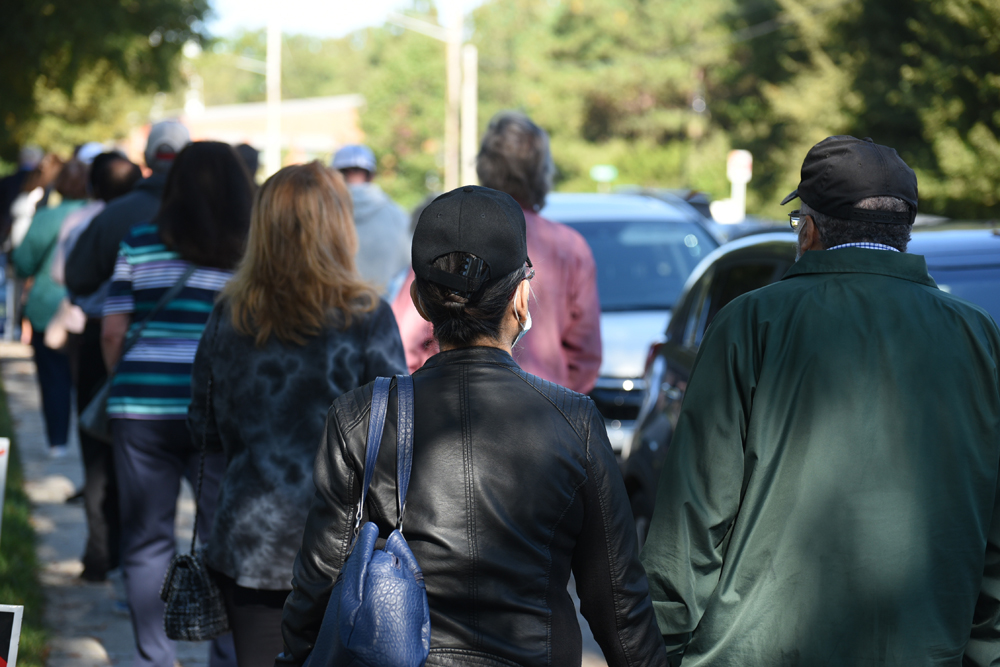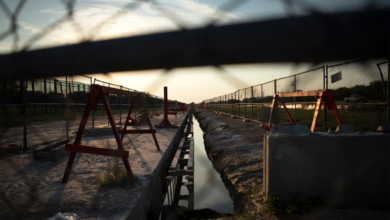
Analysis: Why Is National Media Not Digging Deeper Into Voting Issues?
By Chris Krug | The Center Square
So here it is nearly two weeks past Election Day and the 2020 presidential race remains undetermined.
I think that was somewhat foreseeable. Despite the polls, which were again wildly off and may ultimately be the end of the polling industry, most people I have spoken with about the election over the past year thought this would be a close race no matter who ran against incumbent Republican Donald Trump.
Only people who bought the baloney on the polls believed that the Democrats would roll in a landslide. And any Republican voter who thought that Trump was on easy street against a candidate such as former Vice President Joe Biden, who in three previous tries never generated any electricity among the voting populace, was equally as misguided.
Nearly 150 million votes have been tabulated, and the results continue trickling in. We already have seen more votes cast in this election than any other election in U.S. history – and by a wide margin. Voting, despite COVID-19, and against any past precedent, exploded.
That’s great for democracy if the votes are legitimate. And that remains a point of question that we all should be asking, not only those who voted for Trump. The validity of an election, succinctly, is the election.
So amid what feels to so many Americans as an unwillingness to explore election protocols and integrity by all of the national television networks, metropolitan newspapers, and amplified in endless hours of cable-news opining, we should be willing to do what’s uncomfortable and dig deeper.
If Biden ultimately is declared the winner of an election with inherent voting and vote-tabulation problems, it’s not a win for the country. And if there remains any doubt that he won fairly against Trump, I fear the ramifications of such a victory will prompt more unrest in a nation whose wounds from the mostly peaceful protests that ended in shootings, fires, and damage to public and private property will persist or worsen.
Can you imagine what the backlash in this country would look like if the other side rose up like the protesters did over the past several months? Do we want that? Are we all looking for something that edges toward widespread civil unrest in the United States? I don’t even want to think about it, to be candid. But we all must. And the media has to play its part.
It is with that in mind that I struggle with national media outlets attempting to put the election aside and simply carrying on without digging deeper into the vote itself and the methodology of vote tabulation. It would seem reasonable that a truly centrist media company would be digging now – whether they serve millions of viewers via broadcast or hundreds of readers through their weekly deadwood editions.
The push for such inspection and consideration just isn’t there. It is not widespread in media. In fact, it absolutely feels as if a contradictory sentiment among media has settled on this issue.
It feels as if newsrooms that have the capacity to invest resources in deeper scrutiny of the elections are writing stories and broadcasting segments on how the vote was all good – that there is nothing to see here.
That is such an odd posture for media coverage of anything, let alone a presidential election. I get it, a lot of people despise Trump. But that shouldn’t matter.
And, again, nearly half of the 150 million voters will view the outcome of this election as consequential simply because the Democrat and Republican platforms are so widely varying and the ramifications of either party winning so deeply impactful.
We are still weeks away from certification of the votes, and votes continue to be counted or, in the case of Georgia, recounted by hand.
By law, an election isn’t over until it’s certified. We saw this in 2000, when Republican George W. Bush defeated then former Vice President Al Gore in a painfully examined race that came down to dimpled and hanging chads in Florida some 34 days after the election.
The Associated Press or any of the other big media companies can “call” a race – any race, really. And the others may follow, independently or in unison with The AP. But the election isn’t finished until it’s certified. That is something that all Americans deserve, and – although an arduous and challenging task for newsrooms whose numbers have dwindled as a consequence of brutal shifts in media revenues – that our news providers should be committed to providing.
I only can speak for our news operation, The Center Square, but rest assured that this story matters to us. We consider it open and ongoing, and deserving of daily coverage.
And it should matter to far more media companies than the scant few who are openly interested in seeking the clearest truth in the outcome of the deepest presidential election in our nation’s 244-year history.
* * * *
Elsewhere across the country, The Center Square’s reporting included:
NATIONAL
The Center Square reported that Dominion Voting Systems, which has been used in multiple states where fraud has been alleged in the 2020 U.S. Election, was rejected three times by data communications experts from the Texas Secretary of State and Attorney General’s Office for failing to meet basic security standards. Unlike Texas, other states certified the use of the system, including in Pennsylvania, where voter fraud has been alleged on multiple counts.
ILLINOIS
Illinois’ finances are in a perilous position, as they’ve been for decades. Revenue is shrinking due to the pandemic, a federal package of untethered aid remains uncertain, the state’s lines of credit are becoming increasingly expensive as it teeters on junk bond status, and Gov. J.B. Pritzker’s ballot initiative that would have allowed lawmakers to hike taxes on higher-earners was soundly defeated. In light of all of the fiscal pressures, experts say the state is no closer to amending one of its largest expenses – pension liability – than it was before the pain of 2020 began.
A credit rating agency suggested Illinois lawmakers could make taxpayers pay more to shore up its budget, a mantra a Republican state lawmaker said is tiring. Voters in Illinois and many other states rejected tax increases, but a $6 billion budget deficit still needs to be addressed. “Budget cuts are likely,” Fitch said, “but the state may also raise revenues, such as choosing to increase the flat income tax rate.”
MICHIGAN
Michigan House Speaker Lee Chatfield, R-Levering, said lawmakers will hold hearings to look into election fraud claims in the 2020 presidential election. Questions followed after a software glitch initially gave roughly 5,000 votes cast for President Donald Trump to former Vice President Joe Biden in Antrim County, sparking a manual recount. Other Michigan counties used the same software.
As of Friday afternoon, Republican U.S Senate candidate John James hasn’t conceded his race to incumbent Democrat Gary Peters. Peters garnered 49.8% of the vote, or 2.72 million, to James’ 48.3%, or 2.63 million votes. Despite several news outlets declaring Peters the winner on Wednesday, James released a Thursday statement saying, “while Senator Peters is currently ahead, I have deep concerns that millions of Michiganders may have been disenfranchised by a dishonest few who cheat.”
OHIO
Republican lawmakers in Ohio brought forward legislation aimed at curbing looting, damage caused by riots and attacks on the police. Rep. Cindy Abrams, R-Harrison, a former law enforcement officer, said “Over the summer, we saw peaceful protests and then we saw rioting, vandalism and looting. … The disrespect right now, it is devastating to the uniformed police officers.” The proposed legislation would increase the felony grade for rioting, looting and vandalism to private property, and would increase penalties for damage to public property. It also would allow a police officer assaulted during a riot to sue those responsible, including event organizers.
PENNSYLVANIA
For months leading up to Election Day, Pennsylvania Democratic Gov. Tom Wolf and the Republican lawmakers who control the state Legislature sparred over allowing “pre-canvassing” of mailed-in ballots. Both sides were inclined to allow some amount of pre-canvassing, but they never managed to agree on the parameters, and thus ballots received weeks in advance remained untouched until Election Day. But as Pennsylvania’s vote counting has dragged on for more than a week and a half, it raises the question of whether pre-canvassing would’ve made enough of a difference, or whether there are other structural problems in the state’s vote counting system that meant a lengthy ballot count was inevitable.
NEW YORK
Back in the spring, in the early days of the pandemic in New York, Gov. Andrew Cuomo spoke of economic activity in the state as a spigot that he would open or close depending on how serious the coronavirus became. Ultimately, he chose to turn it all the way off before gradually reopening the state in the summer. Now, in light of statistics showing that cases are rising again – though nowhere nearly as quickly as they did in March – Cuomo is once again exercising his authority to rein in the state’s economic activity, this time by imposing limits on gatherings and restaurant hours.
MINNESOTA
Gov. Tim Walz authorized state assistance for Hennepin County to help rebuild public infrastructure damaged by rioters in May. That will cost state taxpayers $11.7 million – 70% of the $16.5 million disaster relief fund. The Minnesota Department of Public Safety’s damage assessment verified more than $15 million in eligible fire-related damages. The Federal Emergency Management Agency has twice denied Walz’s federal disaster request.
The Minneapolis City Council voted 7-6 to advance a measure to temporarily hire between 20 and 40 additional officers from the Hennepin County Sheriff’s Office and Metro Transit Police to respond to violent 911 calls. Five months ago, the Council vowed to “dismantle” their police department in the wake of the death of George Floyd while in police custody. The reversal follows a record number of homicides in 2020. The city has tallied roughly 74 homicides in the first 10-plus months of 2020, outpacing 48 in 2019. Nearly 500 people have been shot this year while 100 officers have left the department to date in 2020, more than double the typical average.
WISCONSIN
The Republicans who control the legislature in Wisconsin say they want answers about what happened on Election Day. Assembly Speaker Robin Vos. R-Rochester, said election “irregularities” will be investigated across the state. “With concerns surfacing about mail-in ballot dumps and voter fraud, Wisconsin citizens deserve to know their vote counted,” Vos said. The questions come after Milwaukee delivered more than 100,000 votes to swing Wisconsin toward Joe Biden. A similar swing happened in 2018 and gave the state to Gov. Tony Evers.
Gov. Evers will finally move on his plan to name businesses that have seen coronavirus positives. The governor has toyed with the idea of naming names as part of an effort to slow the spread of COVID-19. But he has not followed through, mainly because a judge has stopped him. The National Federation of Independent Businesses in Wisconsin is hoping he never gets to follow through. The NFIB has filed an amicus brief in the court challenge to the governor’s idea of outing businesses.
ARIZONA
In Maricopa County, our reporter sat in on President Trump’s legal challenge to what they said were “thousands” of potentially uncounted ballots. The claim was minimized by testimony from Scott Jarrett, Maricopa County’s Director of Election Day and Emergency Voting, who said they had so far found 190 recorded overvotes. Trump continues to trail Democrat Joe Biden by more than 10,000 votes. Shortly after the hearing ended, more media outlets began to call Arizona for Biden.
GEORGIA
Public pressure on the speed and methodology of vote tabulation in Georgia prompted the state’s Secretary of State to order a hand recount of votes in the presidential race. The recount commenced with former Vice President Joe Biden holding a lead of just over 14,000 votes in a state that saw nearly 5 million votes for president cast. This story is ongoing, and The Center Square will continue to cover the recount.
TENNESSEE
The Center Square was one of two publications to report on Knoxville flight attendant Annlee Post’s federal lawsuit against Transport Workers Union of America Local 577. Post’s lawsuit claims the union violated her civil and constitutional rights when it forced her to pay union dues after she objected on religious grounds. After an investigation by the Equal Employment Opportunity Commission was unable to resolve the matter, Post filed the federal lawsuit, claiming TWU violated her First Amendment and civil rights, as well as her rights as an employee under the Railway Labor Act.
NORTH CAROLINA
An effort in the city of Asheville to award reparations for slavery to Black residents stalled last week after the mayor abruptly suspended discussion on the plan before a city council meeting, sparking backlash from residents and a supporting city council member. The Asheville City Council was supposed to vote on a resolution that would have set aside $1 million for reparations for Black residents, but Mayor Esther Manheimer removed the item from the agenda after a request by most of the city council, which plans to schedule a work session with newly elected council members to review the plan before moving forward.
LOUISIANA
The Bayou State is only one quarter into its 2021 fiscal year, and already the state’s Legislative Auditor is pointing to questionable spending totaling nearly $31 million of revenue from taxpayers. The Center Square reported that Gov. John Bel Edwards’ office of Homeland Security and Emergency Preparedness was responsible for about $24 million of that spend alone. Of that, $15 million came in the form of expense reimbursements that were not backed up by the proper documentation. Other spending in the quarter that is alleged to be outside of the state’s fiscal management practices included spending almost $2.9 million on out-of-scope projects and more than $3.4 million in contracts and purchases that did not comply with state or federal rules and the compensation of $2.4 million in work that was out of compliance with federal regulations.
COLORADO
Colorado voters decided on five tax or fee-related measures in Tuesday’s election. Voters approved Proposition 116, which will reduce the state income tax from 4.63% to 4.55%, and Amendment B, which repeals the Gallagher Amendment and sets residential property tax assessment rates at 7.15%. Voters also approved a tax increase on tobacco and nicotine products, a paid family leave program, and a measure requiring voter approval for new fee-based state enterprises.
OREGON
Oregon lawmakers could be headed to Salem for a third round of legislative action as early as Monday, Nov. 23, a state official revealed during a Portland City Council work session this week. Lawmakers would likely tackle rent assistance, mortgage interest deduction, and reforming qualified immunity for police officers, among other issues. The state’s two previous special sessions saw lawmakers debate a range of bills that addressed use of force by police, unemployment benefit reform, and the state’s budget.
NEVADA
The Security, Police and Fire Professionals of America union will pay thousands of dollars in dues refunds to 24 security guards in Nevada who filed a claim with the federal Labor Relations Board. Las Vegas security guard Justin Stephens and roughly two-dozen coworkers won a settlement against the SPFPA, after they filed a complaint with free legal aid from the National Right to Work Legal Defense Foundation (NRWLF). The guards allege the union took dues from their paychecks and refused to accept their request to resign from the union within the allotted time period, actions their attorneys argued violate provisions of the National Labor Relations Board Act.
TEXAS
A Mexia social worker, Kelly Reagan Brunner, who worked at a State Supported Living Center (SSLC), was charged with 134 felony counts “of purportedly acting as an agent of election fraud,” Texas Attorney General Ken Paxton’s Office announced. SSLCs serve people who have intellectual and developmental disabilities. Brunner was charged with submitting voter registration applications on behalf of 67 residents without their signature or effective consent, while purporting to act as their agent, the AG’s office said.
Chris Krug is the publisher of The Center Square. Executive Editor Dan McCaleb and regional editors Derek Draplin, Dave Lemery, Brett Rowland, Jason Schaumburg, and Bruce Walker contributed to the column. Chris Krug is president of the Franklin News Foundation, a non-partisan 501(c)3 non-profit news organization, and publisher of The Center Square. Contact Chris at ckrug@franklinnews.org.







Want evidence of fraud? Just look at the riots. Anyone that thinks those violent anarchists suddenly drew a line at interfering in our elections, has taken a few too many hits of the peace-pipe.
Arson is prison time. Somehow acquiring and using professional grade mortared fireworks has to violate some kind of law. Then they set them off in busy commercial districts, that is a bombing. These acts are designed to seriously injure, maim, or even kill. They are politically motivated. They are terroristic behavior.
Yet somehow we are supposed to believe these “activists” didn’t think to forge a few ballots. Give me a break.
The SCOTUS and Congress should team up and demand a nation-wide revote. This time, unless there is a known & provable medical condition, everyone needs to vote in person & on election day. (Fraud evaporates when everyone is stuck in line.)